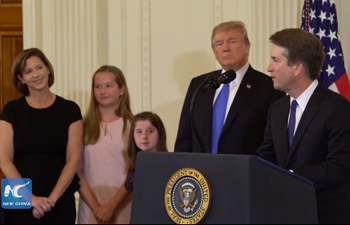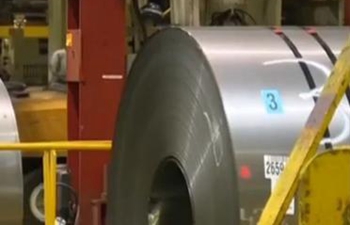SAO PAULO, July 11 (Xinhua) -- Political uncertainty in an election year coupled with protectionist measures by the United States have led Brazil to downgrade its growth forecast for 2018, economists have said.
The lowered expectations follow an initial six months that saw the national currency lose nearly 20 percent of its value against the U.S. dollar, and industrial output fall 10.9 percent in May after a crippling truckers' strike brought economic activity to a standstill for much of the month.
Brazilian financial analysts and economists are now projecting a 1.5percent growth in gross domestic product (GDP), half the original 3 percent rate expected at the start of the year.
"There are several internal and external factors. The external is the inflationary bubble that could burst next year in the United States, due to protectionist measures that directly affect Brazil," said Paulo Dutra, head of economic studies at the Armando Alvares Penteado Foundation (FAAP) in Sao Paulo.
The U.S. interest rate hike and steep tariffs imposed on imported steel and aluminum have had repercussions on Latin America's largest economy. "We have noted a decrease in direct investment," Dutra said.
He said another factor inhibiting growth has been the erosion in legislative support for the pension reform championed by Brazilian President Michel Temer, due to corruption charges against him.
"At the end of 2017, the government envisioned 3 percent growth for 2018, but if we see half of that, it will be considered a success," said Dutra.
Brazil's economy appeared poised for real growth after two years of recession in 2015 and 2016, followed by a modest one-percent growth in 2017, but the ripple effects of U.S. President Donald Trump's global trade war are having a dampening effect on emerging economies, he said.
"Raising the interest rate to avert inflationary pressure in the United States has ended up putting pressure on the real and other currencies, making imports costlier and generating inflation in our countries," said Dutra.
Juliana Inhasz, an economist at the Getulio Vargas Foundation, also said that Temer's failure to implement the pension reform has undermined market confidence.
"The lack of support in Congress for pension reform led the market to alter its expectations about a sustained economic recovery," she said.
In addition, protectionism on the part of the United States combined with low oil prices have made the economic situation in Brazil "more acute," she said.
"If there is a trade war, we could see more pressure on the real to devalue," she added.
As the Oct. 7 presidential elections near, the financial market is expected to resonate with candidates who pledge to privatize state-owned companies, she said.
"We have candidates who are against privatizing state enterprise and increasing the fiscal deficit. If that continues, it could make Brazil's economic situation much tougher," said Inhasz.
Joelson Sampaio, an economics professor at the Getulio Vargas Foundation in Sao Paulo, said the market "is not able to look into the future because there is no clear election scenario as yet -- we don't know what will happen."
At this juncture, investors looking at Brazil still see too many question marks, he said.
"It's an election year and there's a political crisis with an external scenario and the U.S. interest rate. There is somewhat of a restart of growth in the business sector but investors still view Brazil's economy with uncertainty," said Sampaio.













